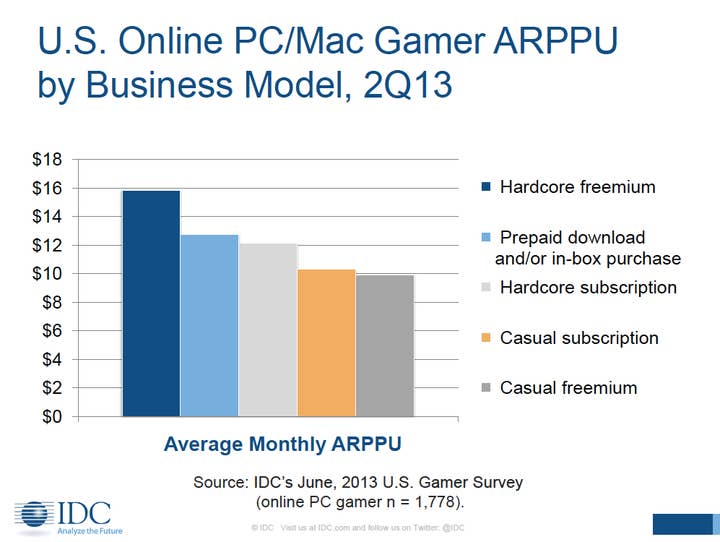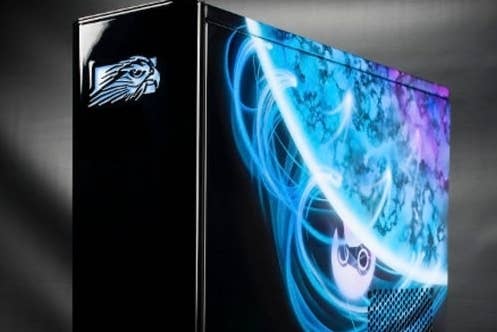Players will be "sucked into Steam Machine" as digital swells - IDC
IDC's Lewis Ward says that Valve has a "significant opportunity" in the living room; PC/Mac digital game sales to top $24 billion by 2017
IDC has shared with GamesIndustry International portions of its Worldwide Digital PC and Mac Gaming 2013-2017 Forecast, which estimates that PC and Mac gamer spending combined with banner/video ad outlays across all digital channels will grow to over $24 billion worldwide by 2017.
Worldwide spending on digital PC/Mac gaming is expected to grow at a rate of about four percent per year, although North American digital PC/Mac gaming revenue is forecast to "slip at the margins" thanks largely to "the cannibalization of casual-leaning, browser-centric games (typified by Zynga's Farmville 2) by smartphones and tablets, compounded by a steady drop in hardcore subscription revenue (typified by Blizzard Entertainment's World of Warcraft)."
The market growth, IDC says, is shifting quickly to countries outside of North America, particularly in BRIC (Brazil, Russia, India and China) regions. Digital PC/Mac gaming revenue outside of North America should grow at better than five percent a year through 2017.
"If Valve can actually get some exclusive freemium games like Dota 2 working great with its controller I think that would be the best possible calling card"
Lewis Ward
The big growth opportunity for much of the world continues to be hardcore freemium (see chart below), as exemplified by League of Legends, World of Tanks and numerous MMORPGs across China. While freemium doesn't always work as well in the West, IDC Research Director Lewis Ward explained to us that the lines are blurring between business models and we're going to see more and more hybrids (like what we've witnessed on Xbox One with Forza 5, for example).
"It's really all about China here. Hardcore freemium games on PCs are crushing it there and to a lesser extent in the other BRIC countries. From a total spending perspective, this tipping point has already come and gone. I think in the West we'll begin to see more $20, $30 and $40 digital downloads that are really starter packs that have freemium payment options baked in. It's going to be an increasingly hybrid monetization model," he said.

Not only will business models start to blend, but the lines separating "PC gaming" from consoles or other platforms will start to be erased as well. "The difference between what PCs, consoles, microconsoles, and perhaps even smart TVs will be able to deliver three years from now will be largely semantic. Relative platform success will boil down to delivering a great overall experience that in turn rests on having the right games, the right business model mix, big data-driven analytics insights, and outstanding social features," added Ward.
In this increasingly digital gaming world, IDC also believes Valve's popular Steam service has a "significant opportunity" to cement its place in North American and Western European living rooms. That assumes, of course, that Valve's Steam Machines initiative turns out to be a success.
Ward doesn't see Valve suddenly wrestling the living room away from Microsoft, Sony and Nintendo, however. "No, I don't have consoles becoming niche. Global console game software and service revenue is shifting from packaged toward digital channels at a rate of about five percent per year. The PC games space is overwhelmingly digital now, but the bottom line is that I have Sony, Nintendo and Microsoft still dominating AAA games in the living room in 2017. Valve and its partners have a real growth opportunity here but they're ramping up from zero," he noted.
So how does Valve ultimately get a piece of the living room? Ward thinks that more and more PC players will look to purchase a Steam Machine the next time they want to upgrade.
"I think a portion of avid PC gamers that don't mind a controller interface and like the big screen audiovisual experience will pick up a Steam Machine instead of a standard PC in their next upgrade cycle," he said. "As long as Valve and its partners keep ramping up their Big Picture games catalog, a portion of those tens of millions of regular Steam users will eventually get sucked into the Steam Machine (clever, I know). If Valve can actually get some exclusive freemium games like Dota 2 working great with its controller I think that would be the best possible calling card."

